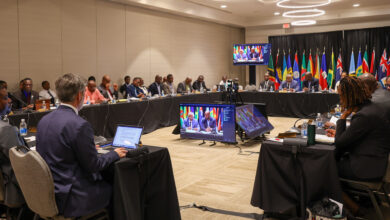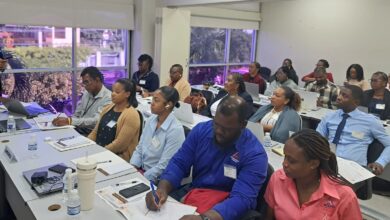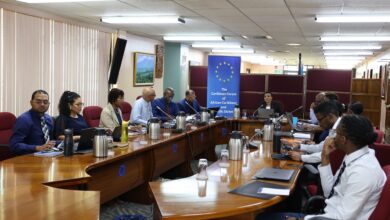|
(CARICOM Secretariat, Turkeyen, Greater Georgetown, Guyana)Mr. Chairman, I wish to congratulate you on your election to the Chair of the Sixth Ministerial Conference. The Barbados Delegation thanks you and the Government of Hong Kong for the warm welcome offered. We have confidence in your capacity to steer the Conference to a positive outcome. We also wish to congratulate Mr. Pascal Lamy on his appointment as the fifth Director General of the World Trade Organisation.
The road from Doha to Hong Kong has been a most difficult and disappointing one. We have lost focus in these negotiations. The development theme which should have underpinned our discussions has been neglected. Indeed, traditional issues again have returned to threaten the success of international trade negotiations. If nothing else, this Conference must once more place development concerns at the forefront of the negotiations. Raising the standard of living of all citizens of a country is the essence of development. It is facilitated through meaningful trade, investment, aid, access to financial resources, appropriate technology and capacity building. These are elements which were not given adequate attention in previous negotiating Rounds. But, the situation is different now because they can be identified in the present WTO Work Programme. They demand our utmost attention. As developing countries we are very clear as to what we want from this Conference. We want special and differential treatment, including longer time periods for implementing Agreements and commitments; measures to increase trading opportunities for our countries; provisions requiring WTO members to safeguard the trade interests of developing countries; and support to help developing countries build the infrastructure to implement trade rules, and to manage trade disputes. We want to have the implementation issues which we have been raising since the first Ministerial Conference in 1996 addressed. These issues span a wide range of agreements including those on TRIPS, Technical Barriers to Trade, Safeguard Measures, Customs Valuation and the TRIMS. We need greater financial and technical assistance to build our capacity in order to participate effectively in international trade. These are some of the matters developing countries wish and need to have addressed. It must be recognised that among developing countries, there are differences in a range of characteristics including size, vulnerability and the availability of natural resources. This is even more evident when consideration is given to the small vulnerable developing countries whose share of global trade is too miniscule ever to distort world trade. It is well documented, that these economies have characteristics which include limited economic diversification, income volatility, a limited economic base, remoteness from global markets, susceptibility to natural disasters, and limited institutional capacity which all require special recognition, and must be addressed within international trade rules. Small vulnerable economies require flexibility and policy space for implementing provisions and commitments under the WTO body of agreements; longer transitional periods; market access for products and services of particular export interest to these economies; support for their regional integration efforts; and significant technical and financial assistance to mitigate administrative, human and institutional limitations. Barbados, as a small, vulnerable, developing country is fully committed to trade liberalisation. We are very supportive of fair international trade rules. For us, liberalisation must however be at a pace which is manageable and which will not be detrimental to our economy and development goals. Rounds of trade negotiations which were considered to be successful were those that achieved specific and pre-defined objectives. In 2001, as trade Ministers, we collectively chose to place development concerns at the core of the negotiations. If this Round of multilateral trade negotiations is to be successful, then it must unequivocally address the concerns of developing countries. Millions of people both in developing and developed countries the world over are depending on us to remove the barriers to completion of the Round. Countries which are currently part of the problem must become part of the solution and resolve their differences to the mutual advantage of all WTO Members. It is a task from which we are not at liberty to abstain.
|
|
BarbadosMemberPress Releases





